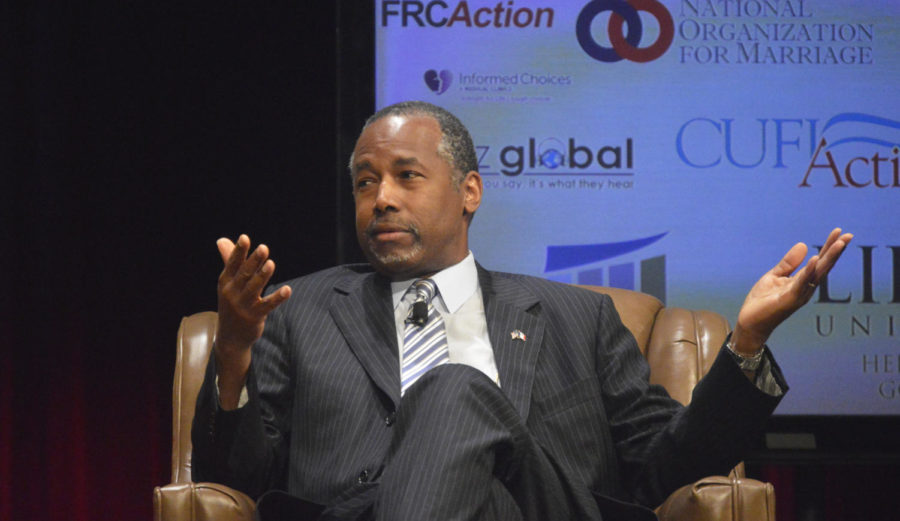Outsider politicians dominating 2016 race
September 1, 2015
Donald Trump dominates the news, Bernie Sanders draws the biggest crowds and Ben Carson maintains double-digit poll numbers — all despite the fact they continue to run as outsiders, shunting the mainstream.
Trump — the billionaire real-estate mogul who has been leading the Republican field most of the summer — has had a sizable lead in most polls, but an interesting note from the latest Iowa poll, released by The Des Moines Register and Bloomberg Politics this past weekend, is that Carson is gaining on Trump.
Trump has 23 percent support from likely caucus goers, while Carson is just behind at 18 percent. The rest of the crowded field does not crack 10 percent, with Wisconsin Gov. Scott Walker the closest at 8 percent.
“If you add together the current numbers for Carly Fiorina, Trump and Carson, almost half of the Republican caucus electorate says they want an outsider,” said Mack Shelley, professor of political science.
Even with all the polished candidates who run tightly controlled campaigns and have tens of millions of dollars, why are the outsiders riding high?
“The people who are supporting the outsiders are sending a message,” said Steffen Schmidt, professor of political science. “We don’t trust politicians, we don’t like what Congress has been doing and these others won’t come through with what they promise.”
Trump, for example, has broken almost every rule of campaigning for president. He’s attacked all of his party opponents right from the start, has made a series of statements that could have collapsed the campaign of almost anyone else and continues to make headlines almost everywhere he goes.
“[Trump dropping in the polls] would have happened already because he’s said some out-of-the-box things,” Schmidt said. “What’s more likely to happen is that people get tired of hearing the same thing over and over again. Trump does not have a coherent speech and just throws a lot out there. [The questionable statements won’t hurt him], but people may just get tired of it.”
While Trump dominates headlines, Carson’s numbers have remained high. Many Republican caucus goers continue to choose him as their first choice, even as he keeps a relatively low profile with his soft-spoken style.
Carson also nets the highest favorability rating in the latest Iowa poll, with 79 percent of those polled saying they have a favorable view of, and 8 percent saying they view him unfavorably. Walker is behind with a 71 percent favorable rating and 15 percent unfavorable, and, by comparison, Trump has a 61 percent favorable rating and a 35 percent unfavorable rating.
Many pundits have predicted Trump, and some of the other outsiders, would fall in the polls by now, whether it’s because of a gaffe or because of a non-traditional campaign.
Many have noted that former Florida Gov. Jeb Bush has brought in more than $100 million, which is likely to help his chances.
“That $100 million hasn’t really bought him much yet,” Shelley said, noting a lot of voters do not view big money in campaigns favorably, with some tying it to special interests that will control the eventual nominee.
On the Democratic side, Sanders — the independent senator from Vermont — has been drawing the largest crowds. Tens of thousands have turned out at some events to see the self-described “democratic socialist” speak on economic inequality, money in politics and climate change.
“Bernie Sanders really connects to the people that go to his events,” Schmidt said. “They’re progressive Democrats [who] are really concerned about the growing gap between the middle class and rich people.”
The latest Iowa poll shows Hillary Clinton still with a narrow lead at 37 percent support, while Sanders is at 30 percent. Vice President Joe Biden, who has not yet made his decision on running, is at 14 percent.
“It’s really more of a Hillary [Clinton] problem [on the Democratic side],” Schmidt said. “When you don’t like somebody, that doesn’t really change over time, and pile on top of that she’s constantly in the news for these emails, which may or may not be a big deal.”
However, the email controversy may not be a problem, at least among Democrats. Among likely Democratic caucus goers, 61 percent say that the email situation is not important to them.
Iowans still have several months to make their decision on a candidate. Caucus night is scheduled for Feb. 1, 2016.

















